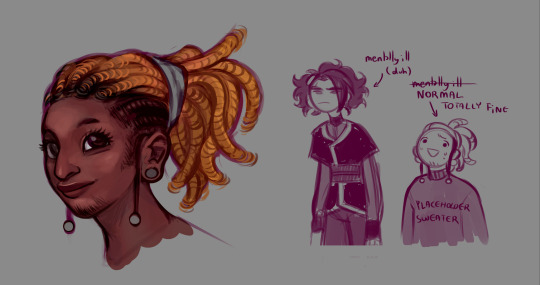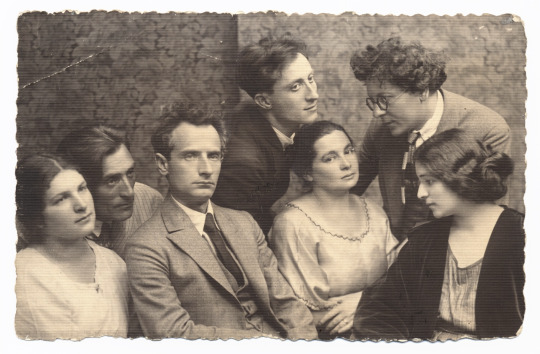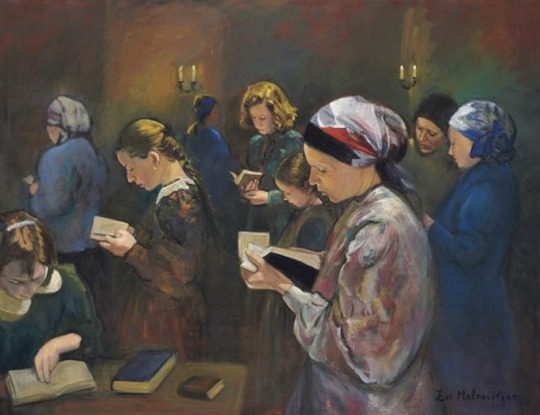#zvi
Text



been posting OC stuff on twitter dot com
#mhek art#my art#magpie#zvi#thats their names ahaha#artists on tumblr#feel free to ask about them idfk
23 notes
·
View notes
Quote
To be clear, when you pay so little to those providing a vital lifesaving service that they do their best to avoid providing it, such folks are not exactly covering themselves in glory, but this is on you, the person who is not paying them enough money. The amounts required would have been trivial.
The Zvi
0 notes
Text

Ramot Polin Housing (1975) in Jerusalem, Israel, by Zvi Hecker
205 notes
·
View notes
Text

The Military Officers' Academy Synagogue by Zvi Hecker and Alfred Neumann, Mitzpe Ramon, Israel, 1968.
(Phaidon)
#design#arctitecture#sculpture#israel#brutalism#zvi hecker#alfred neumann#1960s#1968#synagogue#brutalist#church#temple
226 notes
·
View notes
Text
"The Germans will never forgive the Jews for Auschwitz.”
— Zvi Rex
49 notes
·
View notes
Note
are there any Jews who view Jesus in a positive way (aside from like messianic Jews who, as far I’ve understood, are considered evangelical Christians by all other Jews)
Okay, ah, to answer this question simply: to my knowledge, as far as Jewish communities who (1) self-identify as Jewish, (2) consider themselves practicing Judaism, and (3) deny that Jesus of Nazareth is the Messiah go, none of them have an "official" stance on Jesus. Jesus may be a false Messiah, but this is only a "doctrine" in Judaism the same way that the fact that Vissarion of Siberia is a false Parousia of Jesus is a "doctrine" in Christianity — which is to say, not so much an actually asserted belief, but a natural corollary to more deeply held beliefs.
That being said, individual Jewish people have held a variety of beliefs about Jesus of Nazareth. Some of them are, well, quite negative. For example, one Hasidic story tells of how the Baal Shem Tov saw Jesus and Sabbatai Zvi (both false Messiahs) stuck in the same level of Hell together; the infamous Toledot Yeshu, a parody gospel, certainly does not paint Jesus or His Mother in a particularly good light; Maimonides doesn't even use the usual "may his name be blotted out" as he would when talking about an enemy of Israel, but instead uses "may his bones be ground to dust" after citing Jesus by name.
There are relatively sympathetic views among those whose views are negative too, for the record; for example, there's a story of a Rabbi, Yehoshua ben Prachya, who was said to have been incredibly cruel to a student, and by the time he chose to relent that student had already gone off to form his own idolatrous sect. Struck by the consequences of his harshness, he would go on to emphasize the importance of kindness and giving people the benefit of the doubt. Though the timeline doesn't match up (Yehoshua lived two hundred years before Him), some commentators identified this student as Yeshu the Nazarene.
But, let's actually answer your question. You will find a spectrum of relatively positive views. Bob Dylan technically falls outside the parameters I listed above because he does seem to believe Jesus is the Messiah, but I'll use him as the extreme example, because he continued to be active in his Orthodox Jewish community after his conversion. You also have Leonard Cohen, whose Jewishness was very important to him, who could at least understand the importance of the mystical connection to Jesus that Christians claimed as their own — "the figure of Jesus, nailed to a human predicament, summoning the heart to comprehend its own suffering."
You have some scholars, like Amy-Jill Levine; in the work she did in The Misunderstood Jew, The Historical Jesus in Context, and The Jewish Annotated New Testament, she tries to emphasize the idea that the Person of Jesus is something that can bring Christians and Jews into closer ecumenical dialogue; that if Christians could get more comfortable with the Jewish context of Jesus, and if the Jewish community could see the New Testament as a corpus of texts that isn't non-Jewish, but rather a particular type of first century Jewish, then there could be ground for both groups to better understand each other.
During the early modern period, there were attempts by some Jewish thinkers to reclaim Jesus. Rabbi Jacob Emden argued that Jesus never meant to abolish the Law, and that He has actually "done a double kindness in the world" by increasing veneration of the Torah and bringing light to the Gentiles, if only the Gentiles could learn how to properly interpret their own Scriptures (talk about flipping the script!). Moses Mendelssohn also claimed that Jesus never meant to abrogate the Law, and suggested that Jesus and the early Christian community could be models that modern 19th century Jews living among oppressive Prussian authorities could emulate.
The above paragraph was about Jewish individuals who tried to distance Jesus from traditional Christian understandings of Him. So I'm going to end, I think, with Rabbi Jacob Neusner, who engaged the Gospel on its own terms. In 1993, he published A Rabbi Talks with Jesus. In this book, Rabbi Neusner imagines himself as a first century Jewish man and tries to earnestly listen to and consider the words of Jesus as depicted in the Gospel of Matthew. This work places the words of Jesus in conversation with the Rabbinic tradition, and ultimately ends with Neusner being unconvinced and unable to follow Jesus as His disciple. Pope Benedict lauded this work as an authentic exercise in interreligious dialogue, and cites it frequently in his own Jesus of Nazareth.
#asks#Jesus Christ#Christianity#Judaism#Moses Mendelssohn#Jacob Neusner#Amy-Jill Levine#Toledot Yeshua#Talmud#Baal Shem Tov#Maimonides#Leonard Cohen#Bob Dylan#Yehoshua ben Prachya#Pirkei Avot#Jacob Emden#Sabbatai Zvi#Messiah#religious pluralism
22 notes
·
View notes
Text


JUNE 24 2024- Zvi Sukkot, Member of Knesset from the Religious Zionist party, states: "and this is just the beginning" in response to an article estimating that 200,000 Palestinians have been expelled from the Gaza strip.
Zvi Sukkot was a former representative of the far-right terror group known as "The Revolt", which was responsible for the Duma arson attack which murdered a Palestinian family of three, including 18-month-old Ali Dawabsheh. Between the founding of the group in 2013, and the Duma arson attack, the group was responsible for 11 other arson attacks and remains active to this day.
Sukkot was arrested numerous times, once even on suspicion of an arson attack on a mosque in northern West Bank, though he received no charges for it. Sukkot was not drafted into the IDF, which declared him “unsuitable” for military service.
In 2012, Sukkot was expelled from the West Bank under suspicion that he was part of a group of 12 that had planned and carried out violent attacks against Palestinians and their property.
Despite his violent criminal terrorist past, on November 1st 2023, Sukkot was appointed head of the Knesset West Bank subcommittee.
#palestine#free palestine#gaza#gaza genocide#zvi sukkot#religious zionist party#zionism#apartheid#israeli apartheid#zionism is colonialism#zionist terrorism#zionist fascism#ethnic cleansing#ethnic cleansing of gaza#gaza ethnic cleansing#zionist violence#israel#israeli terrorism#duma arson attack#duma murders#Ali Dawabsheh#Ali Saad Dawabsheh#zionist colonialism#free gaza#genocidal intent
20 notes
·
View notes
Text

Yiddish writers, Warsaw, 1922
From left to right, with short biographies:
Esther (Esye) Elkin (?–?) was the wife of Mendl Elkin.
Mendl Elkin (1874–1962) was born to a family of Jewish farmers in Belarus. Though working as a dentist for six years, he was more interested in arts and culture, and would spend his spare time writing for socialist newspapers and acting in an amateur Russian-Yiddish theatre group. He spent the 1910s–1920s between Bobruisk and Siberia before moving to Vilna and founding a theatre group, as well as editing literary journals and writing poetry. He would later move to New York, where he served as Chief Librarian for YIVO.
Peretz Hirschbein (1880–1948) was born near Grodno; his father operated a water mill. He studied at a yeshiva before becoming a Hebrew teacher. In his 20s he began to write poetry and plays in both Hebrew and Yiddish, and would soon move to Odessa to stage his plays. After his theatre troupe disbanded in 1910, he spent the remainder of his life travelling, finally moving with his wife Esther Shumiatcher to Los Angeles.
Uri Zvi Grinberg (1896–1981) was a Yiddish writer before moving into Hebrew. Born into a Hasidic family in what is today Ukraine, he served in the Austro-Hungarian army. Radicalized by the November 1918 pogrom in Lwów, he spent the interwar period between Palestine and Europe. He co-founded the self-proclaimed fascist group Brit HaBirionim and later served as a Member of Knesset for Herut. He was awarded the Bialik Prize three times, as well as the Israel Prize for his contributions to literature.
Khane Kacyzne (?–?) was the wife of Alter Kacyzne. Together they had a daughter, Shulamith, who survived the Holocaust by hiding as a non-Jew. Khane was murdered at Bełżec.
Alter Kacyzne (1885–1941) was a prolific photographer and writer, born to a bricklayer and a seamstress in Vilna. He took up photography early, at age 14, by which point he had also taught himself Hebrew, Polish, German, Russian, and French (alongside his native Yiddish) and had begun to write poetry. Through the interwar period he worked as a photojournalist, travelling extensively, as well as serving as editor for several literary magazines and writing for communist newspapers. He was beaten to death by Ukrainian fascists in 1941, and his wife Khane was murdered at Bełżec extermination camp.
Esther Shumiatcher (1896–1985) was born in Grodno, though her family emigrated to Alberta, Canada in 1911. Interested in poetry and screenwriting, she worked several jobs to make money: as a waitress, in a meat-packing plant, and helping her family run a boarding house out of their home. In the 1920s she went to Warsaw and worked extensively as a poet; her poem "Albatros" gave its name to a modernist Yiddish journal. She was married to Peretz Hirschbein, whom she met while he was taken ill in Calgary and nursed back to health in her family's home. After her husband's death in 1948, she moved to New York.
From the YIVO Archives.
#yiddish#yidishkeyt#jewish#jewish history#uri zvi greenberg#uri zvi grinberg#esther shumiatcher#peretz hirschbein#perets hirshbeyn#alter kacyzne#khane kacyzne#mendl elkin#esther elkin#1922#jumblr
68 notes
·
View notes
Photo

Zvi Malnovitzer
The Women's Gallery
oil on canvas
89 x 115.9 cm.
356 notes
·
View notes
Text

saying that it is false to call the FMD a regulatory entity*?
the fact that its organizational structure is as a division under some other department is irrelevant to this question
the fact is, it will be able to create new regulation, as is mentioned a few pages ago

like, this "guidance" is not just polite suggestions, but enforceable regulation
#*i assume his issue is not with calling it new#saying that it would have police powers seems pretty false to me#but zvi says “all of this” is false#including the claim that it is a new regulatory entity
4 notes
·
View notes
Text
I've been pretty vocal about how Netanyahu and his extremist allies aren't just fighting a war against Hamas or Gaza or even Palestinians, they're waging a war against other Israelis, doing untold damage in the process. This last week gives us a pretty solid example of that.
In case you hadn't heard, accusations arose in the last few weeks of Israeli soldiers torturing Palestinian detainees at what can really only be described as concentration camps. I know that particular word has some history in Israel that's, shall we say, still raw, but that's effectively what they are.
Anyways, these accusations include using stress positions and restraints on prisoners to the point of causing limb damage that resulted in those limbs being amputated as well as accusations of forced sodomy. Needless to say, this isn't the kind of thing that's acceptable in a liberal democracy that's under the rule of law. The response of Netanyahu's governing coalition, however, was less than ideal. Specifically, take a look at the following exchange (Likud is the name of Netanyahu's party, MK is short of Member of the Knesset, the Knesset is the Israeli Parliament):
MK Ahmad Tibi (TA'AL Party): [Is it legitimate] to insert a stick into a person's rectum?
MK Hanoch Milwidsky (Likud Party): Yes! If he is a Nukhba [Hamas militant], everything is legitimate to do! Everything!
Source
This was just the tip of the iceberg, however, as far-right Israelis, including the Otzma Yehudit Party, which is a member of Netanyau's governing coalition, summoned settlers and other far-right protesters to the Sde Teiman camp where the abuse was alleged to have taken place to protest against the arrest of the accused soldiers. Among those who came were Amihai Eliyahu, a former Member of the Knesset and current Minister for Jerusalem Affairs and Heritage, Almog Cohen, a current Member of the Knesset, both of the Otzma Yehudit Party, and Zvi Sukkot, a Member of the Knesset for the Religious Zionist Party which is also a part of Netanyahu's governing coalition.
As extremist protests tend to do, this one got out of hand and protesters breached the camp, taking control of a good deal of it. Of the elected officials listed above, Sukkot is known to have entered the camp as part of this breach. At this point, none of them are known to have been arrested for their activity, though opposition parties have condemned them.
Source
In other words, the governing coalition of Israel is now justifying torture, arbitrary confinement, and even murder without due process of law or restriction under the laws of war, putting Israel in the company of the worst dictatorships and human rights abusers in the world. It's getting harder and harder for anyone to credibly argue that Israel shares the values of liberal democracy and is governed by the rule of law when its own government increasingly violates both.
And this is the damage to Israel that will persist long after this current conflict with Hamas is over. If the nation is fortunate, a more ethical and lawful government will come to power and restore some of the damage done, but Netanyahu has stained the reputation of his country in ways that will take a generation or more to wash off.
This is why I say that he's waging a war against Israel and why Israel will not be able to recover or move forward until he and his extremist allies are removed from power.
#politics#international politics#benjamin netanyahu#netanyahu#israel#israel palestine conflict#almog cohen#zvi sukkot#amihai eliyahu#sde teiman
2 notes
·
View notes
Text

Palmach Museum of History (1998-2000) in Tel Aviv, Israel, by Zvi Hecker & Rafi Segal
197 notes
·
View notes
Text


Dubiner House, Ramat Gan, Israel. Design by Zvi Hecker, Alfred Neumann, Eldar Sharon.
(Harvard Library)
174 notes
·
View notes
Text

7 notes
·
View notes


